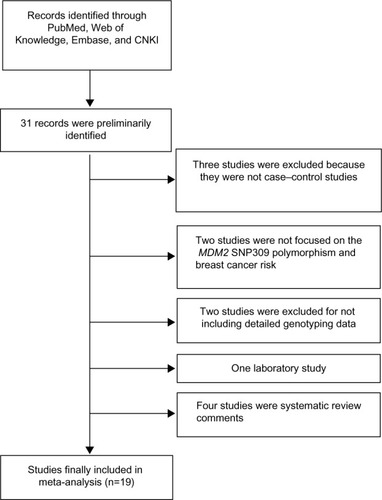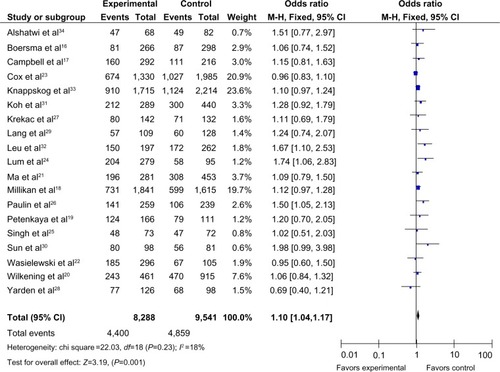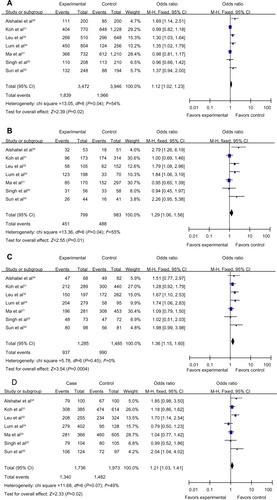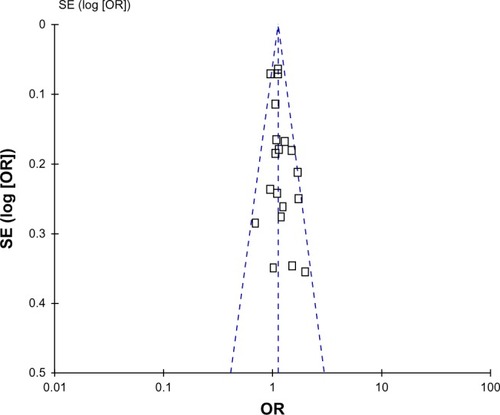Abstract
Purpose
Previous studies have suggested associations between MDM2 (mouse double minute 2 homolog) polymorphisms and cancer risk. The aim of this study was to evaluate the relationship between the MDM2 rs 2279744 polymorphism and the susceptibility of breast cancer.
Methods
We searched PubMed, Web of Knowledge, Embase, and the Chinese National Knowledge Infrastructure (CNKI) database for case–control studies published up to October 2013 that investigated MDM2 rs 2279744 polymorphism and breast cancer risk. Odds ratios (ORs) and 95% confidence intervals (CIs) were used to assess the strength of these associations.
Results
A total of 19 studies were identified for the meta-analysis, including 9,788 cases and 11,195 controls. The variant heterozygote (TG) was associated with breast cancer risk in the overall population (TG vs TT: OR =1.10, 95% CI =1.04–1.17, P=0.001, P=0.23 for heterogeneity test). In the subgroup analyses by ethnicity, a significantly increased risk was observed among Asians (G vs T: OR =1.12, 95% CI =1.02–1.23, P=0.02, Phet=0.04; GG vs TT: OR =1.29, 95% CI =1.06–1.56, P=0.01, Phet=0.04; TG vs TT: OR =1.36, 95% CI =1.15–1.60, P=0.0004, Phet=0.45; dominant model TG+GG vs TT: OR =1.21, 95% CI =1.03–1.41, P=0.02, Phet=0.07). However, among Caucasians, rs 2279744 was associated with breast cancer risk in only one genotype (TG vs TT: OR =1.09, 95% CI =1.00–1.18, P=0.04, Phet=0.37). No publication bias was found in the present study.
Conclusion
This meta-analysis provides evidence for the association between the MDM2 rs 2279744 polymorphism and breast cancer susceptibility. The results suggest that the MDM2 rs 2279744 polymorphism plays an important role in breast cancer, especially in Asians.
Introduction
Breast cancer is one of the major cancers affecting morbidity and mortality of women worldwide. In the US, 232,340 new breast cancer cases were estimated in 2013; breast cancer comprises 29% of all new cancers in females.Citation1 Breast cancer has a hereditary component and is insufficiently explained by high-penetrance genetic risk factors, such as BRCA1 and BRCA2 genes.Citation2 Allele variants in oncogenes are candidate genetic risk factors that may alter breast cancer onset and outcome. Previous research has suggested that breast cancer results from multiple environmental factors, as well as genetic alterations, such as genetic polymorphisms.Citation3,Citation4 However, the exact molecular mechanisms of breast cancer still need intensive investigation.
p53 is a critical tumor suppressor gene that is commonly mutated in human cancers.Citation5 MDM2 (mouse double minute 2 homolog), which encodes the protein located on chromosome 12 ql3-14, is an important regulator of p53, and functions by suppressing p53 activity.Citation6 Furthermore, MDM2 amplifications and overexpression have been considered an alternative mechanism of p53 inactivation in several human cancers.Citation7 MDM2 is overexpressed in various cancers and leads to a worse prognosis in some cancers.Citation8
A functional single nucleotide polymorphism (SNP) has been identified at position 309 within the first intron of the promoter region of the human MDM2 gene, and hence has been designated SNP309 (rs 2279744).Citation9 Transversion of the T allele to the G allele in the region causes a higher affinity for the Sp1 transcription activator, and subsequently enhances the transcription of the MDM2 gene. SNP309 leads to an increase in the expression of MDM2 mRNA and protein, and thereby attenuates the p53 response.Citation9 In recent years, conflicting evidence has linked the SNP309G variant to enhanced risk of different cancer forms.Citation10 The MDM2 rs 2279744 polymorphism has been reported to be associated with some tumors, such as colon cancer, gastric carcinoma, and hepatocellular carcinoma.Citation11–Citation13 However, the association between rs 2279744 and breast cancer was inconsistent.Citation14
Any single study is insufficient to confirm the association of the MDM2 rs 2279744 polymorphism with the risk of breast cancer. This is particularly true for studies with relatively small sample sizes.Citation15 It is important to accumulate data from different studies to provide evidence on the association of the MDM2 polymorphism with breast cancer risk. To clarify the effect of the MDM2 rs 2279744 polymorphism on the risk of breast cancer, we carried out a meta-analysis on all eligible case–control studies to estimate the overall breast cancer risk of the MDM2 rs 2279744 polymorphism. Furthermore, we conducted the subgroup analysis by stratification according to ethnicity.
Materials and methods
Publication search
Computer searches were carried out independently by two authors, in PubMed, Web of Knowledge, Embase, and the Chinese National Knowledge Infrastructure (CNKI) database (last search: October 15, 2013) to collect articles with case–control studies related to the association of the MDM2 rs 2279744 polymorphism and breast cancer risk.
The keywords were as follows: breast cancer/breast carcinoma/breast neoplasm, murine double minute 2/MDM2, and polymorphism/genotype/SNP309/rs 2279744. Furthermore, reference lists of the main reports and review articles were also reviewed by manual search to identify additional relevant publications.
Selection criteria
The following criteria were used to select studies to add to the meta-analysis: 1) case–control studies; 2) the studies evaluated the associations between the MDM2 rs 2279744 polymorphism and breast cancer risk; and 3) the studies included detailed genotyping data (total number of cases and controls, number of cases and controls with T/T, T/G, and G/G genotypes).
Accordingly, the following exclusion criteria were also used: 1) the design of the experiments was not case–control; 2) the source of cases and controls, and other essential information were not provided; 3) the genotype distribution of the control population was not in accordance with the Hardy–Weinberg equilibrium (HWE); and 4) reviews and duplicated publications.
Data extraction and synthesis
Articles were reviewed independently by two authors and data with discrepancies in identification were discussed by all authors. For each included study, the following information was collected: first author, year of publication, country of origin, ethnicity, source of control, numbers of cases and controls, genotyping methods for MDM2 rs 2279744 T/G, and total number of cases and controls, as well as the number of cases and controls with T/T, T/G, and G/G genotypes. Different ethnic ancestries were categorized as Caucasian, Asian, African, and “mixed”. The “mixed” group means mixed or unknown populations. All the case and control groups were well-controlled. The non-cancer controls had no history of gynecologic disease, and there was no present evidence of gynecologic cancer, any malignant disease, or genetic disease. There were no statistically significant differences in terms of age distribution, smoking habits, or menstrual status between case and control groups. When studies included subjects of more than one ethnicity, genotype data were extracted separately according to ethnicities for subgroup analyses.
Statistical analysis
The associations between the MDM2 rs 2279744 polymorphism and breast cancer risk were measured by odds ratios (OR) with 95% confidence intervals (CI). The significance of the pooled OR was determined by the Z-test. Statistical heterogeneity among studies was assessed with the Q and I2 statistics. The Q test and I2 test the variation which was due to heterogeneity or by random error. When the P-value of the heterogeneity tests was no more than 0.1 (P≤0.1), we used the random effects model. When the P-value of the heterogeneity tests was more than 0.1 (P≥0.1), we used the fixed effects model. Sensitivity analysis was also tested by removing one study at a time to calculate the overall homogeneity and effect size. Publication bias was evaluated by funnel plots and further assessed by Egger’s linear regression test.
All statistical analyses were carried out with the review manager (RevMan 5.1 The Cochrane Collaboration, Oxford, UK) and Stata 10 software (Stata Corporation, College Station, TX, USA). All P-values in the meta-analysis were two-sided, and P-values less than 0.05 were considered significant.
Results
Characteristics of studies
As shown in , a total of 31 records that fulfilled our search criteria were preliminarily identified for further detailed evaluation, which excluded 12 studies (). Three studies were excluded because they were not case–control studies. Two studies were not focused on the association between the MDM2 rs 2279744 polymorphism and breast cancer risk. Two studies were excluded because there was no detailed genotyping data. One was a laboratory study, and the rest of the four studies were systematic review comments. Finally, 19 studies on MDM2 rs 2279744 genotypes and breast cancer risk were identified, including a total of 7,815 breast cancer cases and 8,677 controls.Citation16–Citation34 The characteristics of the included studies are listed in .
Figure 1 Flow chart of study selection.

Table 1 Characteristics of the studies included in the meta-analysis
Among the eligible studies, ten studies were based on Caucasian backgrounds which were carried out in the US, UK, Germany, the Netherlands, Finland, Sweden, Israel, and the Czech Republic. Seven were based on Asian ethnicities which were carried out in People’s Republic of China, India, Singapore, and Saudi Arabia. Two included African ethnicities, while two studies included individuals with mixed ethnic descent. Breast cancers were confirmed by histology or pathology in most studies. Moreover, controls were mainly matched in age, of which twelve were population-based and seven were hospital-based.
Meta-analysis results
The main results of this meta-analysis are listed in . As shown in , the variant heterozygote (TG) and homozygote (GG) were associated with breast cancer risk in the overall population (TG vs TT: OR =1.10, 95% CI =1.04–1.17, P=0.001, P=0.23 for the heterogeneity test; GG vs TT: OR =1.09, 95% CI =1.00–1.19, P=0.04, Phet=0.07). However, there were no significant associations between the MDM2 rs 2279744 polymorphism and breast cancer risk in other genotype distributions (G allele vs T allele: OR =1.03, 95% CI =0.99–1.08, P=0.11, Phet=0.06; dominant model TG+GG vs TT: OR =1.06, 95% CI =1.00–1.12, P=0.05, Phet=0.007; recessive model GG vs TT+TG: OR =1.02, 95% CI =0.95–1.11, P=0.55, Phet=0.50).
Figure 2 Forest plots of the MDM2 rs 2279744 polymorphism and breast cancer risk in the overall population (TG vs TT).
Abbreviations: CI, confidence interval; OR, odds ratio; df, degrees of freedom; M-H, Mantel-Haenszel; MDM2, mouse double minute 2 homolog.

Table 2 Meta-analysis of the association between the MDM2 rs 2279744 polymorphism and breast cancer risk
Ten articles, including 5,378 cases and 5,944 controls, were used to investigate the association of the MDM2 rs 2279744 polymorphism with breast cancer susceptibility in Caucasians. The results showed that the MDM2 rs 2279744 polymorphism was associated with breast cancer risk in only one genotype (TG vs TT: OR =1.09, 95% CI =1.00–1.18, P=0.04, Phet=0.37), but no associations in other genetic models (G vs T: OR =1.03, 95% CI =0.97–1.09, P=0.30, Phet=0.60; GG vs TT: OR =1.10, 95% CI =0.98–1.23, P=0.11, Phet=0.59; TG+GG vs TT: OR =1.03, 95% CI =0.95–1.11, P=0.52, Phet=0.08; GG vs TT+TG: OR =1.04, 95% CI =0.93–1.16, P=0.47, Phet=0.48).
Seven articles, including 1,736 cases and 1,973 controls, were used to evaluate the relationship between the MDM2 rs 2279744 polymorphism and breast cancer susceptibility in Asians. In the subgroup analysis by ethnicity, in the Asian population, the results revealed significant associations between the MDM2 rs 2279744 polymorphism and breast cancer in four genetic models (G vs T: OR =1.12, 95% CI =1.02–1.23, P=0.02, Phet=0.04; GG vs TT: OR =1.29, 95% CI =1.06–1.56, P=0.01, Phet=0.04; TG vs TT: OR =1.36, 95% CI =1.15–1.60, P=0.0004, Phet=0.45; TG+GG vs TT: OR =1.21, 95% CI =1.03–1.41, P=0.02, Phet=0.07), but not in the recessive model (GG vs TT+TG: OR =1.04, 95% CI =0.89–1.21, P=0.63, Phet=0.14). A forest plot of the results is shown in .
Figure 3 Forest plots showing the relationship between the MDM2 rs 2279744 polymorphism and breast cancer risk in the Asian subgroup; (A) G vs T; (B) GG vs TT; (C) TG vs TT; (D) TG+GG vs TT.

It is somewhat strange to pool data from Chinese individuals with Arab individuals since these are two very different populations. Therefore, we pooled the data for Eastern Asians (People’s Republic of China and Singapore). These results also showed association between rs 2279744 and breast cancer risk (GG vs TT: OR =1.25, 95% CI =1.01–1.54, P=0.04, Phet=0.06; TG vs TT: OR =1.37, 95% CI =1.15–1.64, P=0.0006, Phet=0.29; TG+GG vs TT: OR =1.19, 95% CI =1.00–1.41, P=0.05, Phet=0.05).
There were only two articles, including 932 cases and 858 controls, that were used to evaluate the relationship between the MDM2 rs 2279744 polymorphism with breast cancer susceptibility in Africans. As shown in , the variant heterozygote (TG) seemed to be associated with breast cancer risk in Africans (TG vs TT: OR =1.31, 95% CI =1.03–1.66, P=0.03, P=0.11 for heterogeneity test). However, there were no significant associations in the other genetic models in Africans (G vs T: OR =1.15, 95% CI =0.94–1.42, P=0.17, Phet=0.21; GG vs TT: OR =0.75, 95% CI =0.39–1.47, P=0.40, Phet=0.57; TG+GG vs TT: OR =1.24, 95% CI =0.99–1.56, P=0.07, Phet=0.14; GG vs TT+TG: OR =0.72, 95% CI =0.37–1.40, P=0.33, Phet=0.53).
Figure 4 Forest plot showing the relationship between the MDM2 rs 2279744 polymorphism and breast cancer risk in the African subgroup (TG vs TT).

Publication bias
Begg’s funnel plot and Egger’s test were performed to assess publication bias. As shown in , the funnel plots did not reveal any obvious asymmetry in all genotypes in the overall population, and the results of Egger’s test revealed no publication bias (P>0.05).
Discussion
Multiple lines of evidence support an important role for genetics in determining risk for cancer, and association studies are appropriate for searching susceptibility genes involved in cancer.Citation35 It has been suggested that SNPs are the most common sources of human genetic variation and they may contribute to an individual’s susceptibility to cancer.Citation36–Citation38
In recent years, interest in the genetic susceptibility to cancers has led to growing attention to the study of gene polymorphisms involved in tumorigenesis. Some genetic polymorphisms of genes have been implicated to alter cancer susceptibility.Citation36,Citation38,Citation39 A previous study indicates that MDM2 SNP309 serves as a tumor susceptibility marker, and that there is an association between MDM2 SNP309 and p53 Arg72Pro regarding tumor susceptibility.Citation38 In vitro analyses revealed that SNP309G enhances Sp1 promoter binding, while SNP285C strongly lessens this binding.Citation33 Comparing MDM2 promoter status among different cohorts of breast cancer patients versus healthy controls, SNP285C reduced the risk of breast cancer (OR =0.79; 95% CI =0.62–1.00) among SNP309G carriers.Citation33
In a large collaborative study by the Breast Cancer Association Consortium, there was no evidence for either an increase in risk or an earlier age at onset of breast cancer in carriers of MDM2 rs 2279744.Citation14 In the previous study, G-allele of MDM2 rs 2279744 accelerated breast cancer tumorigenesis via an estrogen-signaling pathway.Citation40 Meanwhile, in a Japanese study including 557 primary breast cancer patients, although the T/T genotype tended to be associated with better disease-free survival compared to other genotypes of rs 2279744, this association did not achieve significance (P>0.05), and no statistically significant correlation was found between prognosis and MDM2 rs 2279744 genotype.Citation41 The MDM2 promoter rs 2279744 polymorphism influences long-term survival among patients receiving paclitaxel for large primary breast cancers.Citation42
The relationship between the rs 2279744 polymorphism and cancer was inconsistent. Two recent meta-analyses on colorectal and ovarian cancer showed no significant association between the MDM2 rs 2279744 polymorphism and colorectal (or ovarian) cancer risk in total population analysis, respectively.Citation15,Citation43 In the subgroup meta-analysis by ethnicity, a significantly increased risk was observed among Asians in colorectal cancer.Citation15 However, in ovarian cancer, a negative association was shown in the Asian subgroup.Citation43 Two large studies in the USCitation18,Citation23 and other studies in UK,Citation17 Turkish,Citation19 and ChineseCitation21 breast cancer cases found no evidence for an increased risk of breast cancer. However, in the study based on the Chinese/Singapore population, the MDM2 rs 2279744 G allele increased risk while the T allele was associated with earlier onset age of sporadic breast cancers.Citation24 In this meta-analysis, we found that those with the rs 2279744 TG genotype had a significantly increased risk of breast cancer (TG vs TT: OR =1.10, 95% CI =1.04–1.17, P=0.001, Phet=0.23).
A previous meta-analysis reported that the association between MDM2 SNP309 and breast cancer is influenced by race. MDM2 SNP309 represents a risk factor for breast cancer in Chinese women but not in non-Chinese women.Citation44 In our subgroup meta-analysis based on ethnicity, compared with the T allele, a significantly increased risk of breast cancer is associated with the G allele in Asian. Furthermore, compared with the TT genotype, a significantly increased risk of breast cancer is associated with the TG genotype, GG genotype, and the combined TG/GG genotypes subgroup. In the Caucasian subgroup, rs 2279744 was associated with breast cancer risk in only one genotype (TG vs TT: OR =1.09, 95% CI =1.00–1.18, P=0.04, Phet=0.37). Our results indicate that ethnicity may be a main factor on the effects of the polymorphic alleles. It was partially in line with the results of Economopoulos and Sergentanis.Citation44
In the subgroup analysis, we also found that the TG genotype was associated with a significantly increased risk of breast cancer in African individuals. Unfortunately, there were only two studies involved. In addition, as individuals in these two studies were African-American, environmental factors need to be eliminated, as previous findings have shown implications for reconciling differences in the estimates of population growth parameters made using African and African-American populations.Citation45 Further investigations on a large scale on African populations are needed to verify this result.
Some limitations in this meta-analysis must be addressed. First, in the subgroup analyses, the numbers of Asians and Africans were relatively low, with inadequate statistical power to explore the exact correlation. Second, only published studies in English were included in this meta-analysis; some ongoing studies and data published in other languages were not pooled, which may have skewed the results. Third, since limited studies were from Africans, large-scale multicenter epidemiological studies based on Africans with different environmental background are urgently needed. Moreover, further studies estimating the effect of gene–gene and gene–environment interactions may eventually provide a comprehensive understanding of the association between the MDM2 rs 2279744 polymorphism and breast cancer risk.
Conclusion
In summary, the present meta-analysis provides evidence of the association between MDM2 rs 2279744 polymorphism and breast cancer risk. The rs 2279744 polymorphism plays an important role in breast cancer, especially in Asians.
Acknowledgments
This study was supported by the National Natural Science Foundation, People’s Republic of China (No 81274136), the International Cooperative Project of Shaanxi province, People’s Republic of China (No 2013KW-32-01), and the Specialized Research Fund of the Second Affiliated Hospital of Xi’an Jiaotong University, People’s Republic of China (RC [GG] 201203).
Disclosure
The authors report no conflicts of interest in this work.
References
- SiegelRNaishadhamDJemalACancer statistics, 2013CA Cancer J Clin2013631113023335087
- BradburyAROlopadeOIGenetic susceptibility to breast cancerRev Endocr Metab Disord20078325526717508290
- WolffMSWestonABreast cancer risk and environmental exposuresEnviron Health Perspect19971058918969255576
- HulkaBSMoormanPGBreast cancer: hormones and other risk factorsMaturitas2008611–2203213 discussion 21319434892
- LevineAJp53, the cellular gatekeeper for growth and divisionCell19978833233319039259
- MomandJZambettiGPOlsonDCGeorgeDLevineAJThe mdm-2 oncogene product forms a complex with the p53 protein and inhibits p53-mediated transactivationCell1992697123712451535557
- BartelFMeyeAWurlPAmplification of the MDM2 gene, but not expression of splice variants of MDM2 MRNA, is associated with prognosis in soft tissue sarcomaInt J Cancer20019516817511307150
- BondGLHuWBondEEA single nucleotide polymorphism in the MDM2 promoter attenuates the p53 tumor suppressor pathway and accelerates tumor formation in humansCell2004119559160215550242
- RayburnEZhangRHeJWangHMDM2 and human malignancies: expression, clinical pathology, prognostic markers, and implications for chemotherapyCurr Cancer Drug Targets20055274115720187
- HuZJinGWangLChenFWangXShenHMDM2 promoter polymorphism SNP309 contributes to tumor susceptibility: evidence from 21 case-control studiesCancer Epidemiol Biomarkers Prev200716122717272318086778
- MeninCScainiMDe SalvoGAssociation between MDM2-SNP309 and age at colorectal cancer diagnosis according to p53 mutation statusJ Natl Cancer Inst20069828528816478747
- OhmiyaNTaguchiAMabuchiNMDM2 promoter polymorphism is associated with both an increased susceptibility to gastric carcinoma and poor prognosisJ Clin Oncol2006244434444016983111
- YoonYJChangHYAhnSHMDM2 and p53 polymorphisms are associated with the development of hepatocellular carcinoma in patients with chronic hepatitis B virus infectionCarcinogenesis20082961192119618390844
- SchmidtMKReinckeSBroeksADo MDM2 SNP309 and TP53R72P interact in breast cancer susceptibility? A large pooled series from the breast cancer association consortiumCancer Res200767199584959017909070
- FuQZhangGChenHZhengYChengJCurrent evidence on the relationship between SNP309 polymorphism in the MDM2 gene and colorectal cancer riskTumour Biol20133463721372923912932
- BoersmaBJHoweTMGoodmanJEAssociation of breast cancer outcome with status of p53 and MDM2 SNP309J Natl Cancer Inst20069891191916818855
- CampbellIGEcclesDMChoongDYNo association of the MDM2 SNP309 polymorphism with risk of breast or ovarian cancerCancer Lett200624019519716239061
- MillikanRCHeardKWinkelSNo association between the MDM2-309 T/G promoter polymorphism and breast cancer in African-Americans or WhitesCancer Epidemiol Biomarkers Prev20061517517716434608
- PetenkayaABozkurtBAkilli-OzturkOKayaHSGur-DedeogluBYulugIGLack of association between the MDM2-309 polymorphism and breast cancer riskAnticancer Res2006264975497717214373
- WilkeningSBermejoJLBurwinkelBThe single nucleotide polymorphism IVS1+309 in mouse double minute 2 does not affect risk of familial breast cancerCancer Res200666264664816423991
- MaHHuZZhaiXPolymorphisms in the MDM2 promoter and risk of breast cancer: a case-control analysis in a Chinese populationCancer Lett200624026126716288830
- WasielewskiMNagelJHBrekelmansCMDM2 SNP309 accelerates familial breast carcinogenesis independently of estrogen signalingBreast Cancer Res Treat200710415315717080308
- CoxDGDeerDGuoQThe p53 Arg 72 Pro and MDM2-309 polymorphisms and risk of breast cancer in the nurses’ health studiesCancer Causes Control200718662162517387621
- LumSSChuaHWLiHMDM2 SNP309 G allele increases risk but the T allele is associated with earlier onset age of sporadic breast cancers in the Chinese populationCarcinogenesis200829475476118281248
- SinghVRastogiNMathurNSinghKSinghMPAssociation of polymorphism in MDM-2 and p53 genes with breast cancer risk in Indian womenAnn Epidemiol2008181485717719241
- PaulinFEO’NeillMMcGregorGMDM2 SNP309 is associated with high grade node positive breast tumours and is in linkage disequilibrium with a novel MDM2 intron 1 polymorphismBMC Cancer2008828118828900
- KrekacDBrozkovaKKnoflickovaDMDM2SNP309 does not associate with elevated MDM2 protein expression or breast cancer riskOncology2008741–2848718547962
- YardenRIFriedmanEMetsuyanimSOlenderTBen-AsherEPapaMZMDM2 SNP309 accelerates breast and ovarian carci-nogenesis in BRCA1 and BRCA2 carriers of Jewish-Ashkenazi descentBreast Cancer Res Treat200811149750418026875
- LangAPalmebäck WegmanPWingrenSThe significance of MDM2 SNP309 and p53 Arg72Pro in young women with breast cancerOncol Rep200922357557919639206
- SunYFLeuJDChenSMLinIFLeeYJResults based on 124 cases of breast cancer and 97 controls from Taiwan suggest that the single nucleotide polymorphism (SNP309) in the MDM2 gene promoter is associated with earlier onset and increased risk of breast cancerBMC Cancer200991319144119
- KohWPVan Den BergDJinAWangRYuanJMYuMCCombined effects of MDM2 SNP309 and TP53 R72P polymorphisms, and soy isoflavones on breast cancer risk among Chinese women in SingaporeBreast Cancer Res Treat201113031011101921833626
- LeuJDWangCYTsaiHYLinIFChenRCLeeYJInvolvement of p53 R72P polymorphism in the association of MDM2-SNP309 with breast cancerOncol Rep20112561755176321479369
- KnappskogSBjørnslettMMyklebustLMThe MDM2 promoter SNP285C/309G haplotype diminishes Sp1 transcription factor binding and reduces risk for breast and ovarian cancer in CaucasiansCancer Cell201119227328221316605
- AlshatwiAAHasanTNShafiGAlsaifMAAl-HazzaniAAAlsaifAAA single-nucleotide polymorphism in the TP53 and MDM-2 gene modifies breast cancer risk in an ethnic Arab populationFundam Clin Pharmacol201226343844321477265
- RischNMerikangasKThe future of genetic studies of complex human diseasesScience1996273151615178801636
- WilkeningSBermejoJLHemminkiKMDM2 SNP309 and cancer risk: a combined analysisCarcinogenesis2007282262226717827408
- JiangOZhouRWuDLiuYWuWChengNCYP2E1 polymorphisms and colorectal cancer risk: a HuGE systematic review and meta-analysisTumor Biol20133412151224
- WanYWuWYinZGuanPZhouBMDM2 SNP309, gene-gene interaction, and tumor susceptibility: an updated meta-analysisBMC Cancer20111120821619694
- WoXHanDSunHMDM2 SNP309 contributes to tumor susceptibility: a meta-analysisJ Genet Genomics201138834135021867960
- BondGLHirshfieldKMKirchhoffTMDM2 SNP309 accelerates tumor formation in a gender-specific and hormone-dependent mannerCancer Res2006665104511016707433
- ToyamaTZhangZNishioMAssociation of TP53 codon 72 polymorphism and the outcome of adjuvant therapy in breast cancer patientsBreast Cancer Res200793R3417537232
- ChrisantharRKnappskogSLøkkevikEPredictive and prognostic impact of TP53 mutations and MDM2 promoter genotype in primary breast cancer patients treated with epirubicin or paclitaxelPLoS One201164e1924921556366
- MaYYGuanTPYaoHBThe MDM2 309 T.G polymorphism and ovarian cancer risk: a meta-analysis of 1534 cases and 2211 controlsPLoS One201381e5501923383041
- EconomopoulosKPSergentanisTNDifferential effects of MDM2 SNP309 polymorphism on breast cancer risk along with race: a meta-analysisBreast Cancer Res Treat2010120121121619590949
- LohmuellerKEBustamanteCDClarkAGThe effect of recent admixture on inference of ancient human population historyGenetics2010185261162220382834

